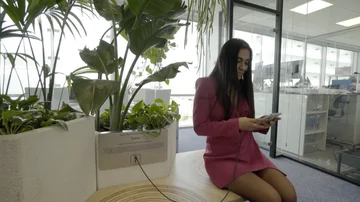Touch a plant and light up a lamp. It may sound like science fiction, but it’s already real. It may sound like magic, but there is a lot of research behind it. And it has been achieved by a biotechnological company from Viladecans (Barcelona). We explain it in this video.
They have managed to create nothing less than energy from the natural process of plants. They capture the electricity released in photosynthesis. “In any park, garden or land, there is a presence of organic matter,” Pablo Vidarte, CEO and founder of Bioo, explains to laSexta. Naturally, microorganisms “eat” this organic matter and release electrons. That’s where their technology comes in: “What we do is trap these electrons in an electric current they give off,” says Vidarte.
As an example of its operation, the bank of plants that you can see in the video, in which a mobile phone can be charged thanks to the energy captured.

But, in addition, they have also created biological switches: the plant detects our presence by touching it and is capable of activating sound or even light, like the pot that we show in the video and that will be released soon.
With this same technology, which has had the support from European Union funds, this R&D company has even managed to create a biological piano. In short, they seek in biotechnology to cause a change in the relationship with nature, says Vidarte.
Innovation in batteries
Another of the important open fronts that Europe has in its search for the energy revolution is innovation in batteries.
The challenge is clear. Mobile phones, tablets, hybrid cars… The increase in the consumption of digital devices, as well as that of electric vehicles, means that year after year the number of batteries used throughout the world also rises. In fact, as we see in this graph, the number of electric cars recorded each year is increasing by leaps and bounds, and in 2020 they were already 11% of all cars registered in Europe.
And the EU wants there to be many more: its goal is for at least 30 million electric vehicles to circulate on European roads by 2030.
Therefore, a European project is seeking to produce more sustainable and efficient electric batteries.
The Marbella projectled by the Catalan technology center Eurecat, and with a budget of more than 11.7 million euros, is developing a new lightweight and competitive battery that lasts longer and charges in less time.
“We want to reduce loading time by 25%,” says Alberto Gómez, coordinator of Marbel, which brings together 16 partners from eight countries and is made up of six research centers.
In the same vein, the European Parliament works in a update of current battery directive that addresses the environmental, ethical and social issues related to this product, a market that the EU considers strategic.
It is, according to the European Commission, to guarantee that these can be reused, remanufactured or recycled at the end of their useful life. The EU estimates that the world demand for cells and batteries will multiply by 14 between now and 2030 and the European market will account for 17% of all that demand. However, and according to data from the European Commission, in 2019 only 51% of batteries were collected for recycling sold in the EU.
Source: Lasexta
Mario Twitchell is an accomplished author and journalist, known for his insightful and thought-provoking writing on a wide range of topics including general and opinion. He currently works as a writer at 247 news agency, where he has established himself as a respected voice in the industry.












